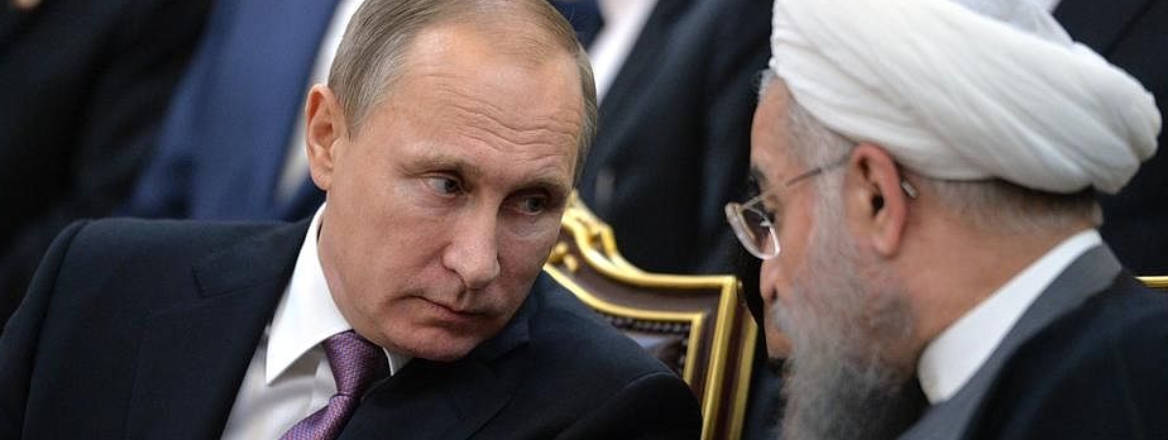A surprising Iranian–Russian deal to base Russian aircraft on Iranian territory collapsed largely because Russian President Vladimir Putin and his officials ignored Tehran’s aspirations and views.
It looked like a real coup: six Russian ‘Backfire’ (Tu-22M3) bombers relocated on 15 August to Hamadan (‘Hamedan’) Shahid Nojeh, Iran’s 3rd tactical airbase 300 km southwest of Tehran, to carry out strikes against targets in Syria from Iranian soil. The bombers came from the 200th Guards Heavy Bomber Regiment permanently deployed at Belaya airbase near Irkutsk in Siberia; later on, Fullback (Su-34) fighter-bombers joined the Backfires at their new base, and both types of aircraft began sorties on 16 August, continuing until Tehran called an abrupt halt to the operation on 22 August.
The Russian media banged its martial drums from the operation’s outset, as in October 2015 when the Russian navy launched Kalibr sea-based cruise missiles against targets in Syria for the first time. This time, media reports and public commentaries trumpeted Moscow’s clear message: Russia is a great power deploying and operating its forces at will, and is therefore fully equal to the US, an ‘indispensible’ player on the international stage, the one nation with the ability to settle the most sensitive issues even with a most uncomfortable partner, such as Iran.
And to a certain extent, the situation appeared remarkable: for the first time since the Second World War, Tehran provided basing rights on its territory to a foreign power, despite it being forbidden under Iran’s constitution. This concession implied Moscow’s ultimate ability to strike otherwise impossible deals, itself a valuable resource in the turbulent Middle East.
However, Moscow might have celebrated too soon. On 22 August, Tehran called a halt to the military cooperation and barred the Russians from using its bases. One reason for this surprising turn of events is the political tussle in Iran where Defence Minister Brigadier General Hossein Dehghan was accused of ‘disrespecting parliament’ and of violating the country’s constitution. In keeping with the way it usually treats its allies (for example, Moscow’s announcement of a Russian airbase in Belarus in September 2015, when the Belarussian government had not granted permission to base Russian jets there), Moscow’s decision to publicise the otherwise secret deployment without ever consulting Tehran undermined the Iranian government’s move.
A mistaken assessment of Russia’s real place in Tehran’s foreign policy considerations was another serious flaw in the Hamedan deployment story. Moscow’s excessive self-confidence, paired with its tactical rather than strategic approach to policy planning, is typical of President Vladimir Putin’s policy over the past several years. It helped to persuade the Kremlin that the Iranians needed Russia more than the other way round and that Moscow therefore had plenty of room for manoeuvre. Putin’s inclination to build alliances on the basis of confronting something or somebody, rather than by constructive cooperation, also led Moscow to the wrong conclusion that Tehran’s anti-US rhetoric was a sufficient guarantee of strong Russian–Iranian ties. The Kremlin did not take full account of Iran’s own domestic sensitivities.
Nor did anyone in Moscow appear to understand that the introduction of Russian aircraft could have implied the hypothetical danger of nuclear sanctions being reintroduced against Iran. Indeed, Annex B, P4 of UN Security Council Resolution 2231 (2015), which lifted the sanctions imposed on Iran a decade ago, specifically points to the ban of both transferring to Iran, directly or indirectly, without overt UNSC permission, equipment that might contribute to the Iranians’ ability to develop nuclear weapon delivery means other than ballistic missiles (Para 4 [a]), or providing Iran with training related to the manufacture or use of nuclear weapon delivery means (Para 4 [b]).
Due to ambiguity regarding Russia’s rights at the Hamedan airbase, Iranian officials found themselves in an uneasy situation. Iran’s protestations that the Russians were not in full control of the base, so their presence was not ‘basing’ per se, was designed to appease domestic critics who alleged a violation of the country’s constitution. The claims implied at the same time, however, that the Iranians had a certain degree of access to Russian nuclear-capable bombers (Backfires and Fullbacks are nuclear-capable aircraft), thus potentially resulting in Iran obtaining the banned training. Russian public statements on the ‘invaluable experience of combat cooperation’ that the Iranians received as the result of Russian bomber deployment only confused the issue further. This concern was raised in a news briefing by Mark Toner, spokesperson for the US State Department: ‘As I understand it, it’s not just supplying the Iranians certain weapons or certain offensive weaponry. It’s more complex than that.’ So it seemed that whatever the outcome of Moscow’s propaganda efforts around the deployment from Hamedan it would be either highly unwelcome or disastrous for Tehran.
This lack of trust between Russia and Iran, highlighted in a RUSI paper last month, has been festering for some time. Russia is competing fiercely in oil markets at a time when Iran is refusing point blank to cap crude production to increase oil prices. There is little doubt that this, too, may have contributed to Tehran’s sudden decision to curtail Russia’s use of the Hamedan airbase, accompanying the move with unprecedented undiplomatic statements. Hossein Dehghan accused Russia of a ‘betrayal of trust’.
The history of Russia’s use of Iranian airbases has, therefore, been brief: a lack of respect for its allies, along with poor understanding of other nations’ motives and internal politics has resulted in another botched Russian diplomatic effort, like the outcome of Moscow’s ‘peacemaking’ proposal to federalise Syria, fiercely rejected by both anti-Assad rebels and Damascus itself. This is a reminder that there are severe limits to the Kremlin’s adventurism in the Middle East. That might well be the silver lining to the otherwise dark cloud that continues to hang over Syria.


